The Cambridge History of China. Vol. 13: Republican China 1912-1949, Part 2
Подождите немного. Документ загружается.

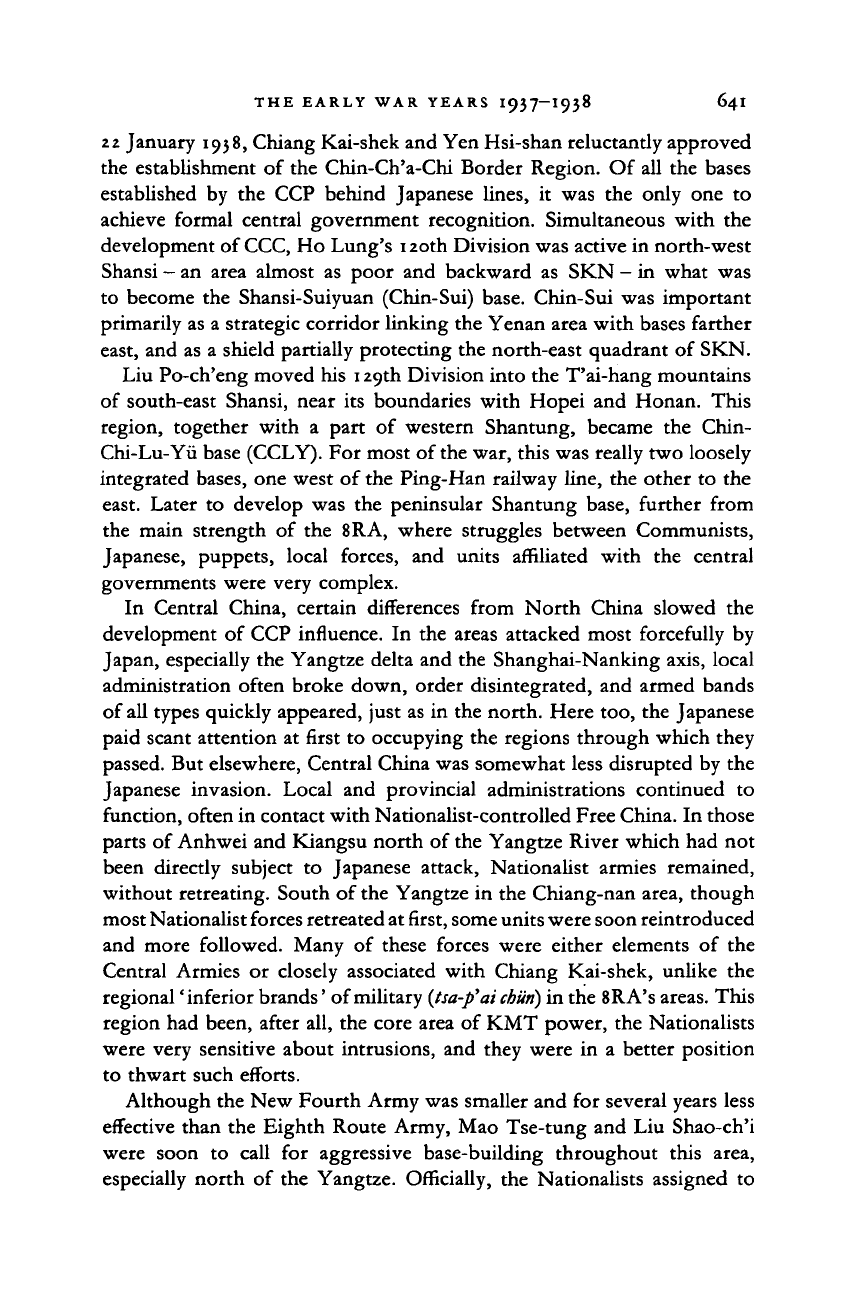
THE EARLY WAR YEARS 1937-I938 64I
22 January 1938, Chiang Kai-shek and Yen Hsi-shan reluctantly approved
the establishment of the Chin-Ch'a-Chi Border Region. Of all the bases
established by the CCP behind Japanese lines, it was the only one to
achieve formal central government recognition. Simultaneous with the
development of
CCC,
Ho Lung's 120th Division was active in north-west
Shansi - an area almost as poor and backward as SKN - in what was
to become the Shansi-Suiyuan (Chin-Sui) base. Chin-Sui was important
primarily as a strategic corridor linking the Yenan area with bases farther
east, and as a shield partially protecting the north-east quadrant of SKN.
Liu Po-ch'eng moved his 129th Division into the T'ai-hang mountains
of south-east Shansi, near its boundaries with Hopei and Honan. This
region, together with a part of western Shantung, became the Chin-
Chi-Lu-Yii base (CCLY). For most of the war, this was really two loosely
integrated bases, one west of the Ping-Han railway line, the other to the
east. Later to develop was the peninsular Shantung base, further from
the main strength of the 8RA, where struggles between Communists,
Japanese, puppets, local forces, and units affiliated with the central
governments were very complex.
In Central China, certain differences from North China slowed the
development of CCP influence. In the areas attacked most forcefully by
Japan, especially the Yangtze delta and the Shanghai-Nanking axis, local
administration often broke down, order disintegrated, and armed bands
of all types quickly appeared, just as in the north. Here too, the Japanese
paid scant attention at first to occupying the regions through which they
passed. But elsewhere, Central China was somewhat less disrupted by the
Japanese invasion. Local and provincial administrations continued to
function, often in contact with Nationalist-controlled Free China. In those
parts of Anhwei and Kiangsu north of the Yangtze River which had not
been directly subject to Japanese attack, Nationalist armies remained,
without retreating. South of the Yangtze in the Chiang-nan area, though
most Nationalist forces retreated at
first,
some units were soon reintroduced
and more followed. Many of these forces were either elements of the
Central Armies or closely associated with Chiang Kai-shek, unlike the
regional 'inferior brands' of military
{tsa-p'ai chiiri)
in trie 8RA's
areas.
This
region had been, after all, the core area of KMT power, the Nationalists
were very sensitive about intrusions, and they were in a better position
to thwart such efforts.
Although the New Fourth Army was smaller and for several years less
effective than the Eighth Route Army, Mao Tse-tung and Liu Shao-ch'i
were soon to call for aggressive base-building throughout this area,
especially north of the Yangtze. Officially, the Nationalists assigned to
Cambridge Histories Online © Cambridge University Press, 2008
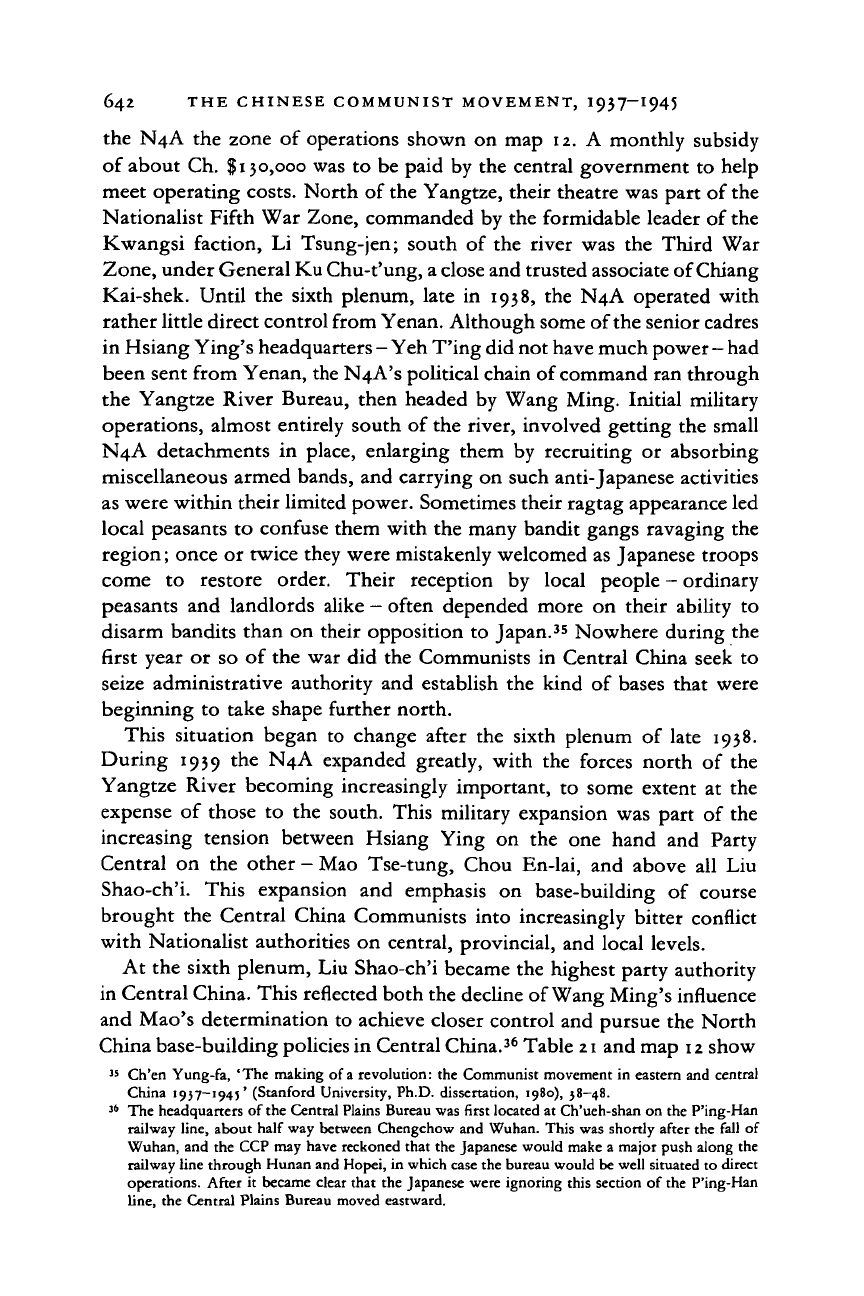
642 THE CHINESE COMMUNIST MOVEMENT, I937-I945
the N4A the zone
of
operations shown on map 12.
A
monthly subsidy
of about Ch. $130,000 was to be paid by the central government to help
meet operating costs. North of the Yangtze, their theatre was part of the
Nationalist Fifth War Zone, commanded by the formidable leader of the
Kwangsi faction,
Li
Tsung-jen; south
of
the river was the Third War
Zone, under General Ku Chu-t'ung, a close and trusted associate of Chiang
Kai-shek. Until the sixth plenum, late
in
1938, the N4A operated with
rather little direct control from Yenan. Although some of the senior cadres
in Hsiang Ying's headquarters
-
Yeh T'ing did not have much power - had
been sent from Yenan, the N4A's political chain of command ran through
the Yangtze River Bureau, then headed by Wang Ming. Initial military
operations, almost entirely south of the river, involved getting the small
N4A detachments
in
place, enlarging them
by
recruiting
or
absorbing
miscellaneous armed bands, and carrying on such anti-Japanese activities
as were within their limited power. Sometimes their ragtag appearance led
local peasants to confuse them with the many bandit gangs ravaging the
region; once or twice they were mistakenly welcomed as Japanese troops
come
to
restore order. Their reception
by
local people
-
ordinary
peasants and landlords alike
—
often depended more
on
their ability
to
disarm bandits than on their opposition to Japan.
35
Nowhere during the
first year
or
so
of
the war did the Communists in Central China seek
to
seize administrative authority and establish the kind
of
bases that were
beginning to take shape further north.
This situation began
to
change after the sixth plenum
of
late 1938.
During 1939 the N4A expanded greatly, with the forces north
of
the
Yangtze River becoming increasingly important,
to
some extent
at
the
expense
of
those
to
the south. This military expansion was part
of
the
increasing tension between Hsiang Ying
on the
one hand
and
Party
Central
on
the other
-
Mao Tse-tung, Chou En-lai, and above
all
Liu
Shao-ch'i. This expansion
and
emphasis
on
base-building
of
course
brought the Central China Communists into increasingly bitter conflict
with Nationalist authorities on central, provincial, and local levels.
At the sixth plenum, Liu Shao-ch'i became the highest party authority
in Central China. This reflected both the decline of Wang Ming's influence
and Mao's determination to achieve closer control and pursue the North
China base-building policies in Central China.
36
Table
21
and map 12 show
" Ch'en Yung-fa, ' The making of
a
revolution: the Communist movement in eastern and central
China 1937—1945' (Stanford University, Ph.D. dissertation, 1980), 38-48.
36
The headquarters of the Central Plains Bureau was first located at Ch'ueh-shan on the P'ing-Han
railway line, about half way between Chengchow and Wuhan. This was shortly after the fall of
Wuhan, and the CCP may have reckoned that the Japanese would make a major push along the
railway line through Hunan and Hopei, in which case the bureau would be well situated to direct
operations. After
it
became clear that the Japanese were ignoring this section of the P'ing-Han
line,
the Central Plains Bureau moved eastward.
Cambridge Histories Online © Cambridge University Press, 2008
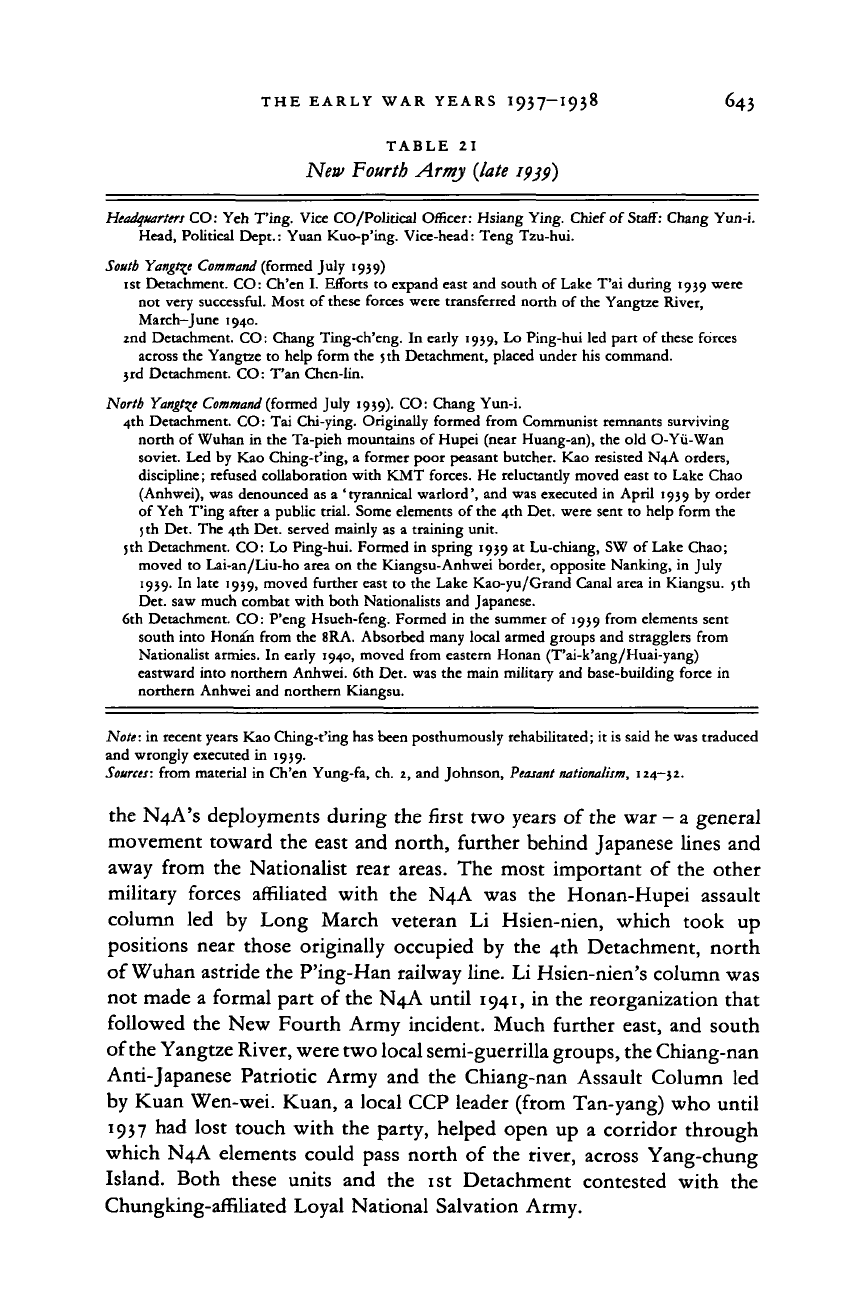
THE EARLY WAR YEARS I937—1938 643
TABLE 21
New
Fourth
Army
{late
ipjp)
Headquarters
CO: Yeh Ting. Vice CO/Political Officer: Hsiang Ying. Chief of
Staff:
Chang Yun-i.
Head, Political Dept.: Yuan Kuo-p'ing. Vice-head: Teng Tzu-hui.
South Yangtze
Command
(formed July 1939)
1st Detachment. CO: Ch'en I. Efforts to expand east and south of Lake T'ai during 1939 were
not very successful. Most of these forces were transferred north of the Yangtze River,
March—June 1940.
2nd Detachment. CO: Chang Ting-ch'eng. In early 1939, Lo Ping-hui led part of these forces
across the Yangtze to help form the 5 th Detachment, placed under his command.
3rd Detachment. CO: T'an Chen-lin.
North
Yangtze Command
(formed July 1939). CO: Chang Yun-i.
4th Detachment. CO: Tai Chi-ying. Originally formed from Communist remnants surviving
north of Wuhan in the Ta-pieh mountains of Hupei (near Huang-an), the old O-Yii-Wan
soviet. Led by Kao Ching-t'ing, a former poor peasant butcher. Kao resisted N4A orders,
discipline; refused collaboration with KMT forces. He reluctantly moved east to Lake Chao
(Anhwei), was denounced as a 'tyrannical warlord', and was executed in April 1939 by order
of Yeh Ting after a public trial. Some elements of the 4th Det. were sent to help form the
j
th Det. The 4th Det. served mainly as a training unit.
jth Detachment. CO: Lo Ping-hui. Formed in spring 1939 at Lu-chiang, SW of Lake Chao;
moved to Lai-an/Iiu-ho area on the Kiangsu-Anhwei border, opposite Nanking, in July
1939.
In late 1939, moved further east to the Lake Kao-yu/Grand Canal area in Kiangsu. ;th
Det. saw much combat with both Nationalists and Japanese.
6th Detachment. CO: P'eng Hsueh-feng. Formed in the summer of 1939 from elements sent
south into Honih from the 8RA. Absorbed many local armed groups and stragglers from
Nationalist armies. In early 1940, moved from eastern Honan (Tai-k'ang/Huai-yang)
eastward into northern Anhwei. 6th Det. was the main military and base-building force in
northern Anhwei and northern Kiangsu.
Note: in recent years Kao Ching-t'ing has been posthumously rehabilitated; it is said he was traduced
and wrongly executed in 1939.
Sources:
from material in Ch'en Yung-fa, ch. 2, and Johnson,
Peasant
nationalism,
124—32.
the N4A's deployments during the first two years of the war - a general
movement toward the east and north, further behind Japanese lines and
away from the Nationalist rear areas. The most important of the other
military forces affiliated with the N4A was the Honan-Hupei assault
column led by Long March veteran Li Hsien-nien, which took up
positions near those originally occupied by the 4th Detachment, north
of Wuhan astride the P'ing-Han railway line. Li Hsien-nien's column was
not made a formal part of the N4A until 1941, in the reorganization that
followed the New Fourth Army incident. Much further east, and south
of the Yangtze River, were two local semi-guerrilla groups, the Chiang-nan
Anti-Japanese Patriotic Army and the Chiang-nan Assault Column led
by Kuan Wen-wei. Kuan, a local CCP leader (from Tan-yang) who until
1937 had lost touch with the party, helped open up a corridor through
which N4A elements could pass north of the river, across Yang-chung
Island. Both these units and the 1st Detachment contested with the
Chungking-affiliated Loyal National Salvation Army.
Cambridge Histories Online © Cambridge University Press, 2008
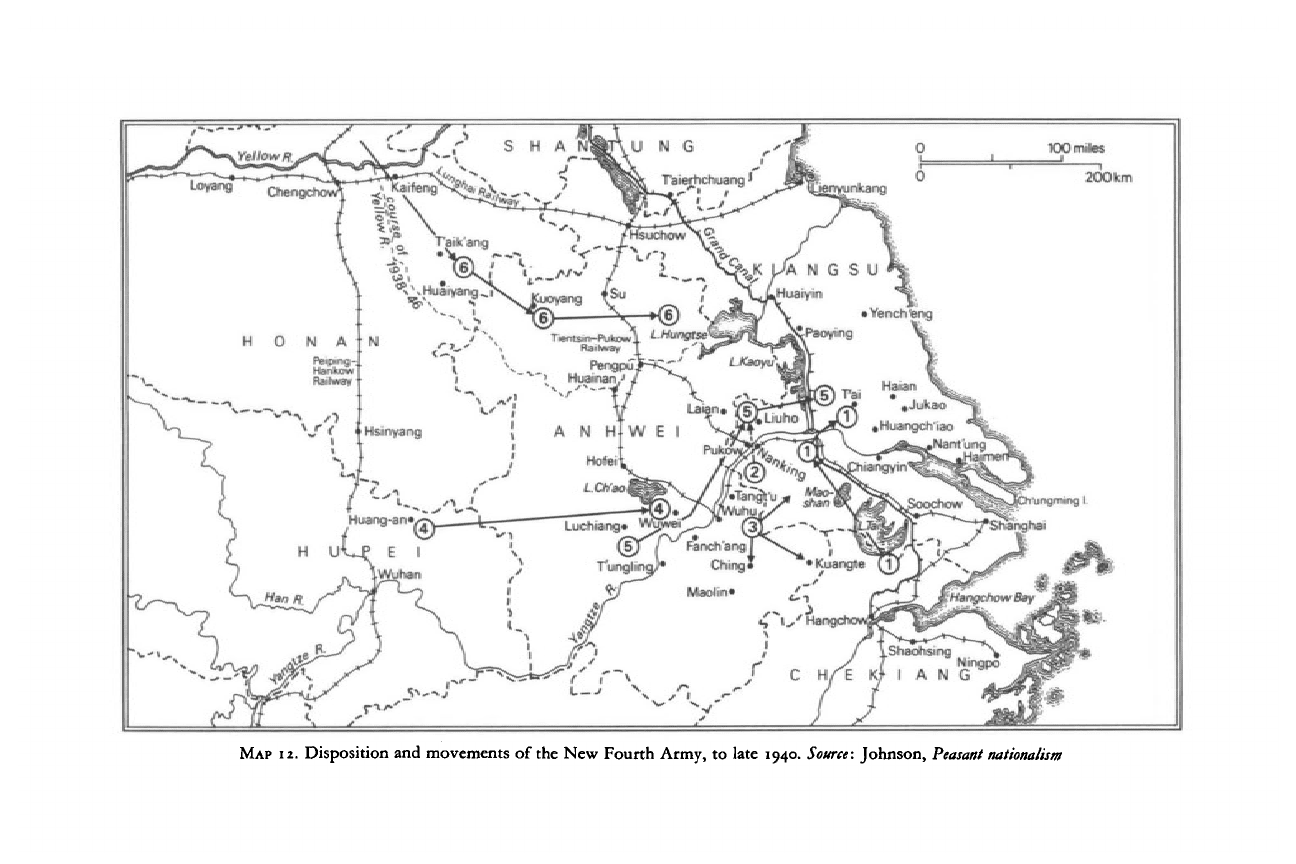
100 miles
200km
K UA N G S U
Huaiyin
• Yench^ing
^Paoying
Tientsin-Pukowl LHungtse
Railway
A N HJWE I
'ungming I
Shanghai
•
Kuangte
(T
Shabhsing
I A N
MAP
12. Disposition and movements of the New Fourth Army, to late 1940.
Source:
Johnson,
Peasant nationalism
Cambridge Histories Online © Cambridge University Press, 2008
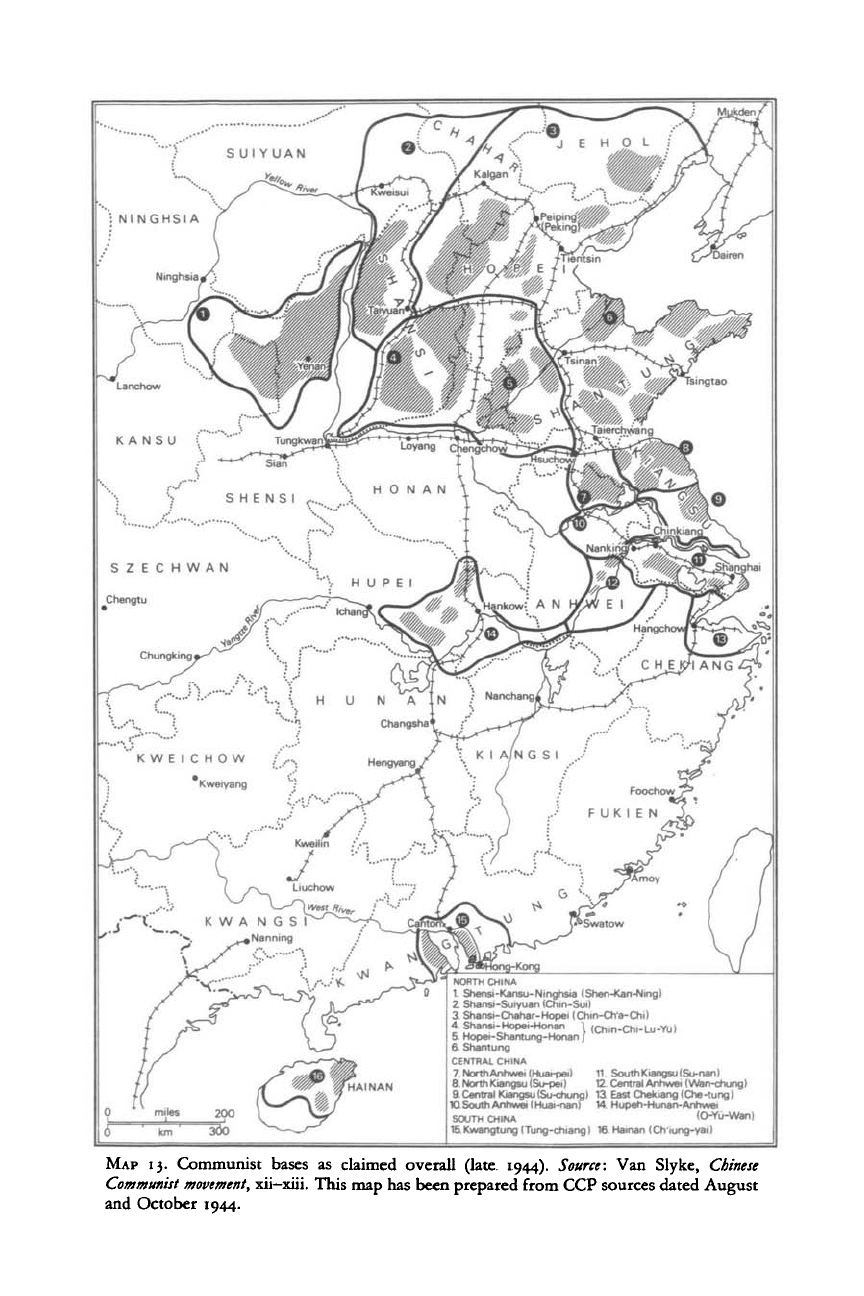
1
'•-•••••
•'•- U =, H U N
KWEICHOW
; Kweiyang
6 km 300
IRTH CHINA
t Shensi-Kansu-Ninghsia (Shen-Kan-Ning)
Z Shansi-Suiyuan (Cnin-Sui)
3. Shansi-Chahar-Hopei (Chin-Ch'a-Chi)
SSISSSSX}
SISSS
6. Shantung
CENTRAL CHINA
7.
NorthAnhwei (HuaHpei) 11. South
Kiangsu
(Su-nan)
8NorthKiangsu(Su-pei)
12.
Central
Anhwei Mfen-ohung)
9.Central
Kiangsu(Su-chung)
n
East Chekiang(Che-tung)
ntSouthAnnweilHuai-nanr 14. Hupeh-Hunan-Anhwei
SOUTH CHINA (C^Vu-Wan)
ISLKwangtung (Tung-chiang) 16. Hainan (Ch'iung-yai)
MAP
13.
Communist bases
as
claimed overall (late. 1944).
Source:
Van
Slyke,
Chinese
Communist
movement,
xii-xiii. This map has been prepared from CCP sources dated August
and October 1944.
Cambridge Histories Online © Cambridge University Press, 2008
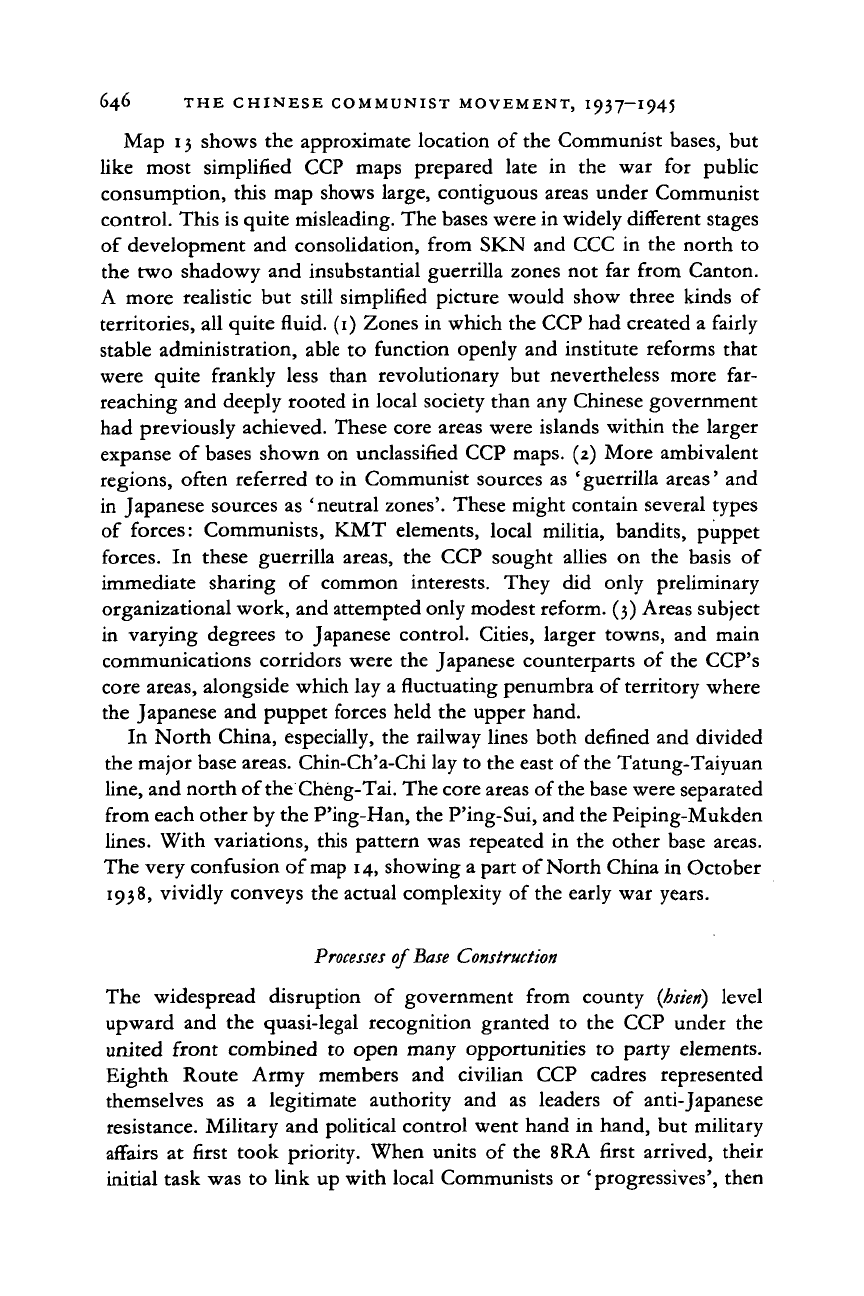
646 THE CHINESE COMMUNIST MOVEMENT, 1937-1945
Map
13
shows
the
approximate location
of
the Communist bases,
but
like most simplified
CCP
maps prepared late
in the war for
public
consumption, this
map
shows large, contiguous areas under Communist
control. This is quite misleading. The bases were in widely different stages
of development
and
consolidation, from
SKN and
CCC
in
the
north
to
the
two
shadowy
and
insubstantial guerrilla zones
not far
from Canton.
A more realistic
but
still simplified picture would show three kinds
of
territories,
all
quite fluid,
(i)
Zones
in
which
the
CCP had created
a
fairly
stable administration, able
to
function openly
and
institute reforms that
were quite frankly less than revolutionary
but
nevertheless more
far-
reaching and deeply rooted
in
local society than any Chinese government
had previously achieved. These core areas were islands within
the
larger
expanse
of
bases shown
on
unclassified CCP maps.
(2)
More ambivalent
regions, often referred
to in
Communist sources
as
' guerrilla areas'
and
in Japanese sources
as
'neutral zones'. These might contain several types
of forces: Communists,
KMT
elements, local militia, bandits, puppet
forces.
In
these guerrilla areas,
the
CCP
sought allies
on the
basis
of
immediate sharing
of
common interests. They
did
only preliminary
organizational work, and attempted only modest reform. (3) Areas subject
in varying degrees
to
Japanese control. Cities, larger towns,
and
main
communications corridors were
the
Japanese counterparts
of
the CCP's
core areas, alongside which lay
a
fluctuating penumbra
of
territory where
the Japanese
and
puppet forces held
the
upper hand.
In North China, especially,
the
railway lines both defined
and
divided
the major base areas. Chin-Ch'a-Chi lay
to
the east
of
the Tatung-Taiyuan
line,
and north of the Cheng-Tai. The core areas of
the
base were separated
from each other by the P'ing-Han, the P'ing-Sui, and the Peiping-Mukden
lines.
With variations, this pattern
was
repeated
in
the
other base areas.
The very confusion
of
map
14, showing a part of North China
in
October
1938,
vividly conveys the actual complexity
of
the early
war
years.
Processes
of
Base Construction
The widespread disruption
of
government from county
(bsieri)
level
upward
and the
quasi-legal recognition granted
to
the CCP
under
the
united front combined
to
open many opportunities
to
party elements.
Eighth Route Army members
and
civilian
CCP
cadres represented
themselves
as a
legitimate authority
and as
leaders
of
anti-Japanese
resistance. Military
and
political control went hand
in
hand,
but
military
affairs
at
first took priority. When units
of
the 8RA
first arrived, their
initial task was
to
link up with local Communists
or
' progressives', then
Cambridge Histories Online © Cambridge University Press, 2008
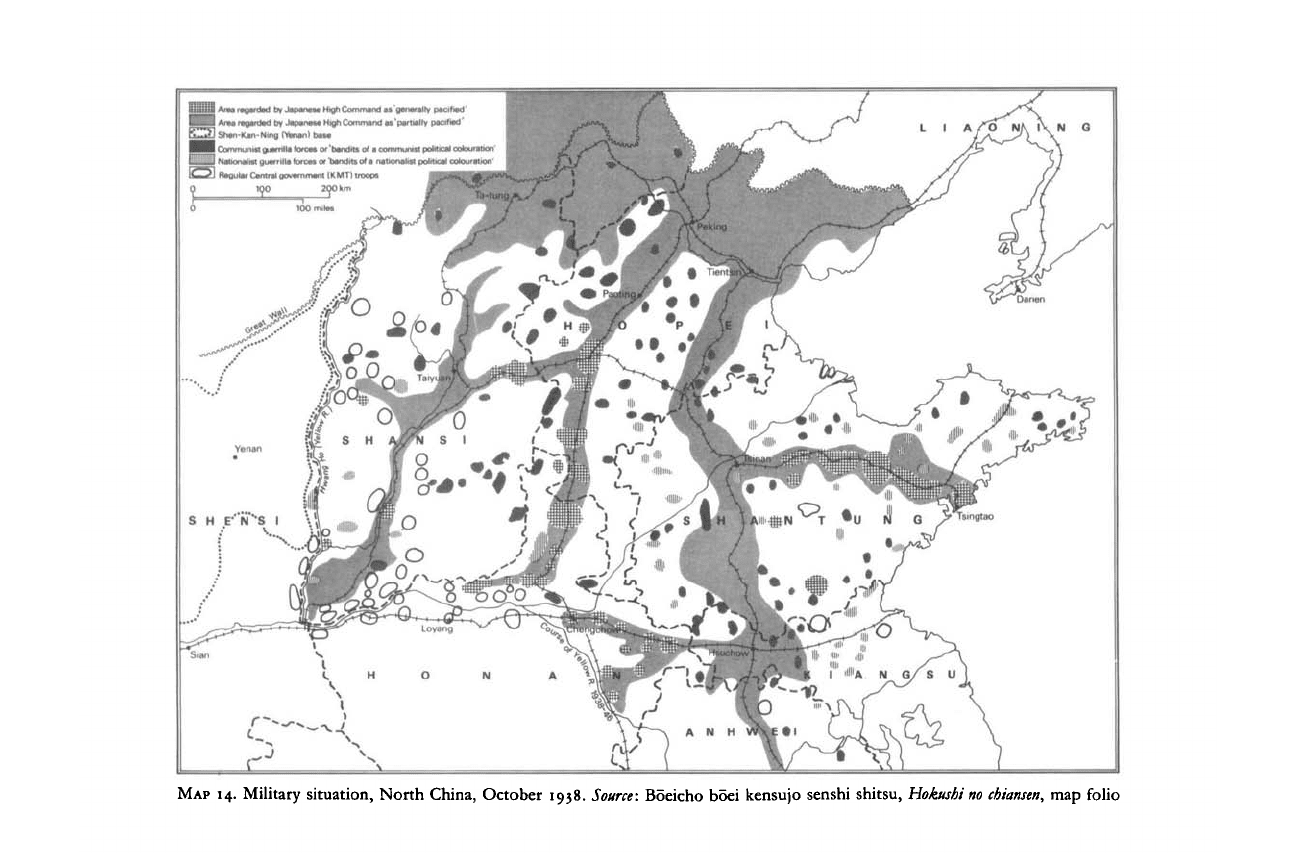
3
AIM
regarded by Japanese High Command as'goneralry pacified'
I
ATM
regarded by Japanese High Command w'partially pacified'
D Shan-Kan-Ning Manan) basa
I Communitt guerrilla forces or 'bandits of a communist political colouration'
u Nationalist guarrilla forces or oonditsof a nationfiltst political colourvtion'
U Regular Central govammant (KMT) troops
iqo 200km
100 mites
MAP
14. Military situation, North China, October
1938.
Source:
Boeicho boei kensujo senshi shitsu,
Hokusbi no
cbiansen,
map folio
Cambridge Histories Online © Cambridge University Press, 2008
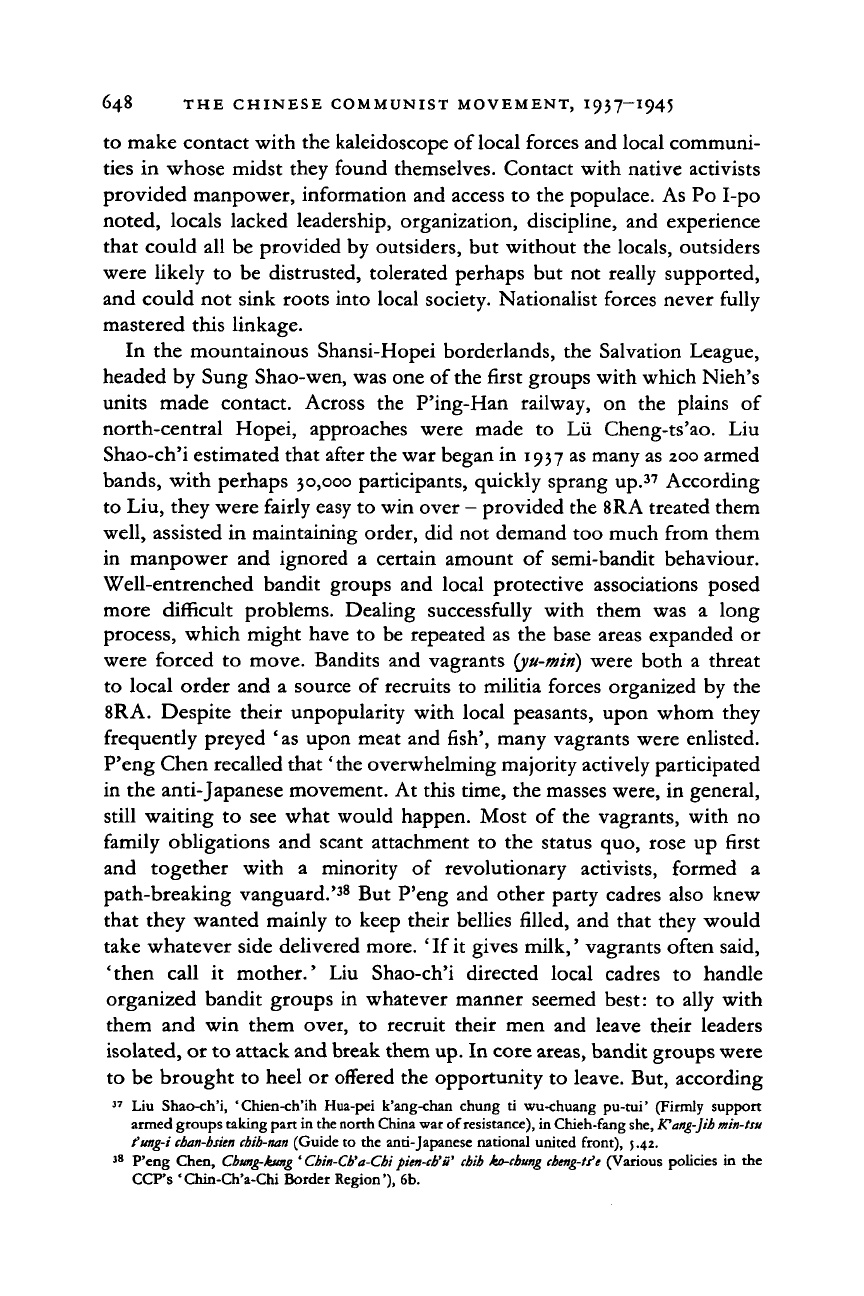
648 THE CHINESE COMMUNIST MOVEMENT, 1937-1945
to make contact with the kaleidoscope of local forces and local communi-
ties
in
whose midst they found themselves. Contact with native activists
provided manpower, information and access to the populace. As Po I-po
noted, locals lacked leadership, organization, discipline, and experience
that could all be provided by outsiders, but without the locals, outsiders
were likely
to
be distrusted, tolerated perhaps but not really supported,
and could not sink roots into local society. Nationalist forces never fully
mastered this linkage.
In the mountainous Shansi-Hopei borderlands, the Salvation League,
headed by Sung Shao-wen, was one of the first groups with which Nieh's
units made contact. Across
the
P'ing-Han railway,
on the
plains
of
north-central Hopei, approaches were made
to Lii
Cheng-ts'ao.
Liu
Shao-ch'i estimated that after the war began in 1937 as many as 200 armed
bands,
with perhaps 30,000 participants, quickly sprang up.
37
According
to Liu, they were fairly easy to win over
-
provided the 8RA treated them
well, assisted in maintaining order, did not demand too much from them
in manpower and ignored
a
certain amount
of
semi-bandit behaviour.
Well-entrenched bandit groups and local protective associations posed
more difficult problems. Dealing successfully with them was
a
long
process, which might have
to
be repeated as the base areas expanded
or
were forced
to
move. Bandits and vagrants (ju-min) were both
a
threat
to local order and
a
source of recruits to militia forces organized by the
8RA. Despite their unpopularity with local peasants, upon whom they
frequently preyed '
as
upon meat and fish', many vagrants were enlisted.
P'eng Chen recalled that 'the overwhelming majority actively participated
in the anti-Japanese movement. At this time, the masses were, in general,
still waiting
to
see what would happen. Most
of
the vagrants, with
no
family obligations and scant attachment
to
the status quo, rose up first
and together with
a
minority
of
revolutionary activists, formed
a
path-breaking vanguard.'
38
But P'eng and other party cadres also knew
that they wanted mainly to keep their bellies filled, and that they would
take whatever side delivered more. ' If it gives milk,' vagrants often said,
' then call
it
mother.'
Liu
Shao-ch'i directed local cadres
to
handle
organized bandit groups
in
whatever manner seemed best:
to
ally with
them and win them over,
to
recruit their men and leave their leaders
isolated, or to attack and break them up. In core areas, bandit groups were
to be brought to heel or offered the opportunity to leave. But, according
37
Liu
Shao-ch'i, 'Chien-ch'ih Hua-pei k'ang-chan chung
ti
wu-chuang pu-tui' (Firmly support
armed groups taking part
in
the north China war of resistance), in Chieh-fang she, ICang-Jib min-tsu
fung-i cban-bsien cbib-nan (Guide
to the
anti-Japanese national united front), j.42.
38
P'eng
Chen,
Cbimg-kimg
'
Cbin-Cb'a-Cbi
pien-cb'S'
cbib ko-cbimg cbtng-tt'e (Various
policies
in the
CCP's 'Chin-Ch'a-Chi Border Region'), 6b.
Cambridge Histories Online © Cambridge University Press, 2008
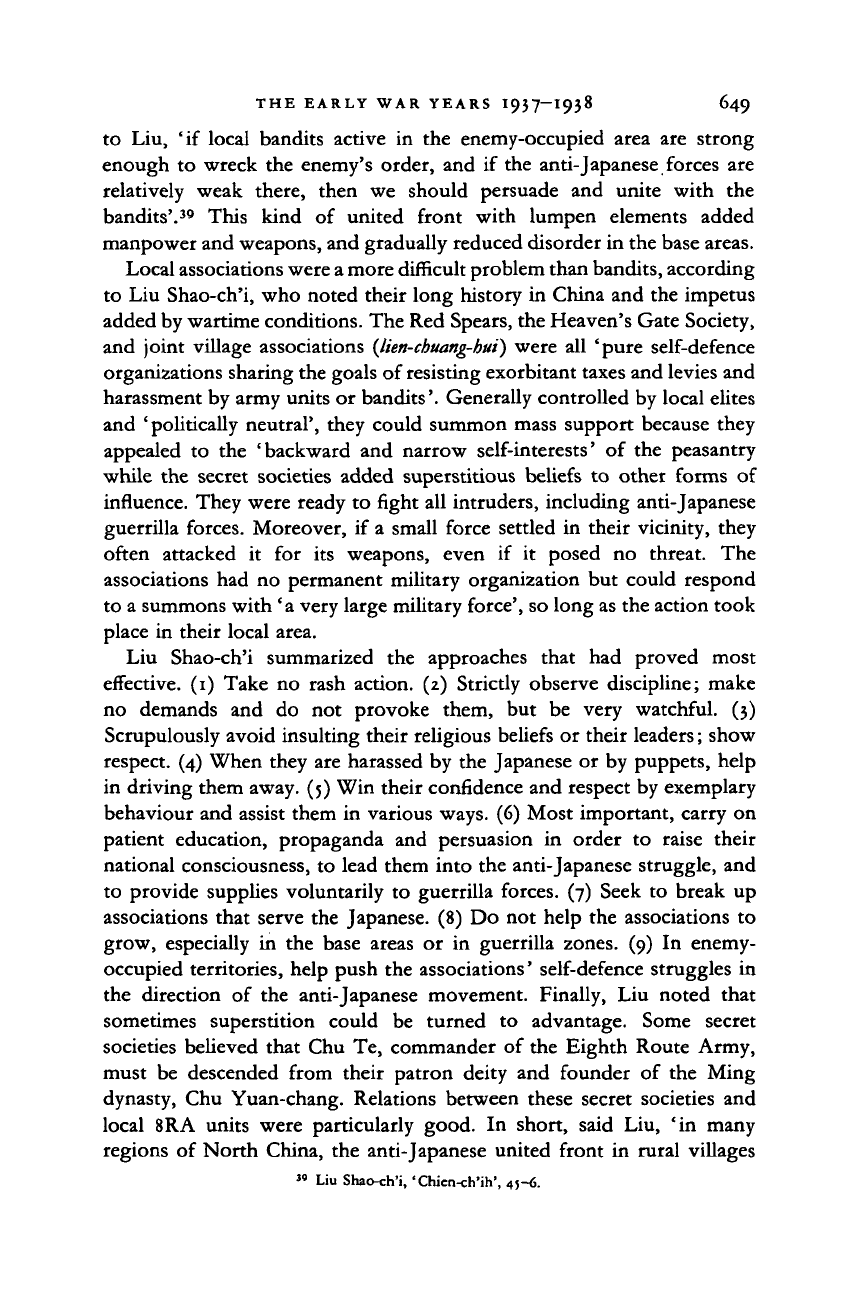
THE EARLY WAR YEARS I937-I938 649
to Liu, 'if local bandits active in the enemy-occupied area are strong
enough to wreck the enemy's order, and if the anti-Japanese forces are
relatively weak there, then we should persuade and unite with the
bandits'.
39
This kind of united front with lumpen elements added
manpower and weapons, and gradually reduced disorder in the base areas.
Local associations were a more difficult problem than bandits, according
to Liu Shao-ch'i, who noted their long history in China and the impetus
added by wartime conditions. The Red Spears, the Heaven's Gate Society,
and joint village associations
(lien-chuang-hui)
were all 'pure self-defence
organizations sharing the goals of resisting exorbitant taxes and levies and
harassment by army units or bandits'. Generally controlled by local elites
and 'politically neutral', they could summon mass support because they
appealed to the 'backward and narrow self-interests' of the peasantry
while the secret societies added superstitious beliefs to other forms of
influence. They were ready to fight all intruders, including anti-Japanese
guerrilla forces. Moreover, if a small force settled in their vicinity, they
often attacked it for its weapons, even if it posed no threat. The
associations had no permanent military organization but could respond
to a summons with 'a very large military force', so long as the action took
place in their local area.
Liu Shao-ch'i summarized the approaches that had proved most
effective, (i) Take no rash action. (2) Strictly observe discipline; make
no demands and do not provoke them, but be very watchful. (3)
Scrupulously avoid insulting their religious beliefs or their leaders; show
respect. (4) When they are harassed by the Japanese or by puppets, help
in driving them away. (5) Win their confidence and respect by exemplary
behaviour and assist them in various ways. (6) Most important, carry on
patient education, propaganda and persuasion in order to raise their
national consciousness, to lead them into the anti-Japanese struggle, and
to provide supplies voluntarily to guerrilla forces. (7) Seek to break up
associations that serve the Japanese. (8) Do not help the associations to
grow, especially in the base areas or in guerrilla zones. (9) In enemy-
occupied territories, help push the associations' self-defence struggles in
the direction of the anti-Japanese movement. Finally, Liu noted that
sometimes superstition could be turned to advantage. Some secret
societies believed that Chu Te, commander of the Eighth Route Army,
must be descended from their patron deity and founder of the Ming
dynasty, Chu Yuan-chang. Relations between these secret societies and
local 8RA units were particularly good. In short, said Liu, 'in many
regions of North China, the anti-Japanese united front in rural villages
35
Liu Shao-ch'i,
'
Chien-ch'ih', 45-6.
Cambridge Histories Online © Cambridge University Press, 2008
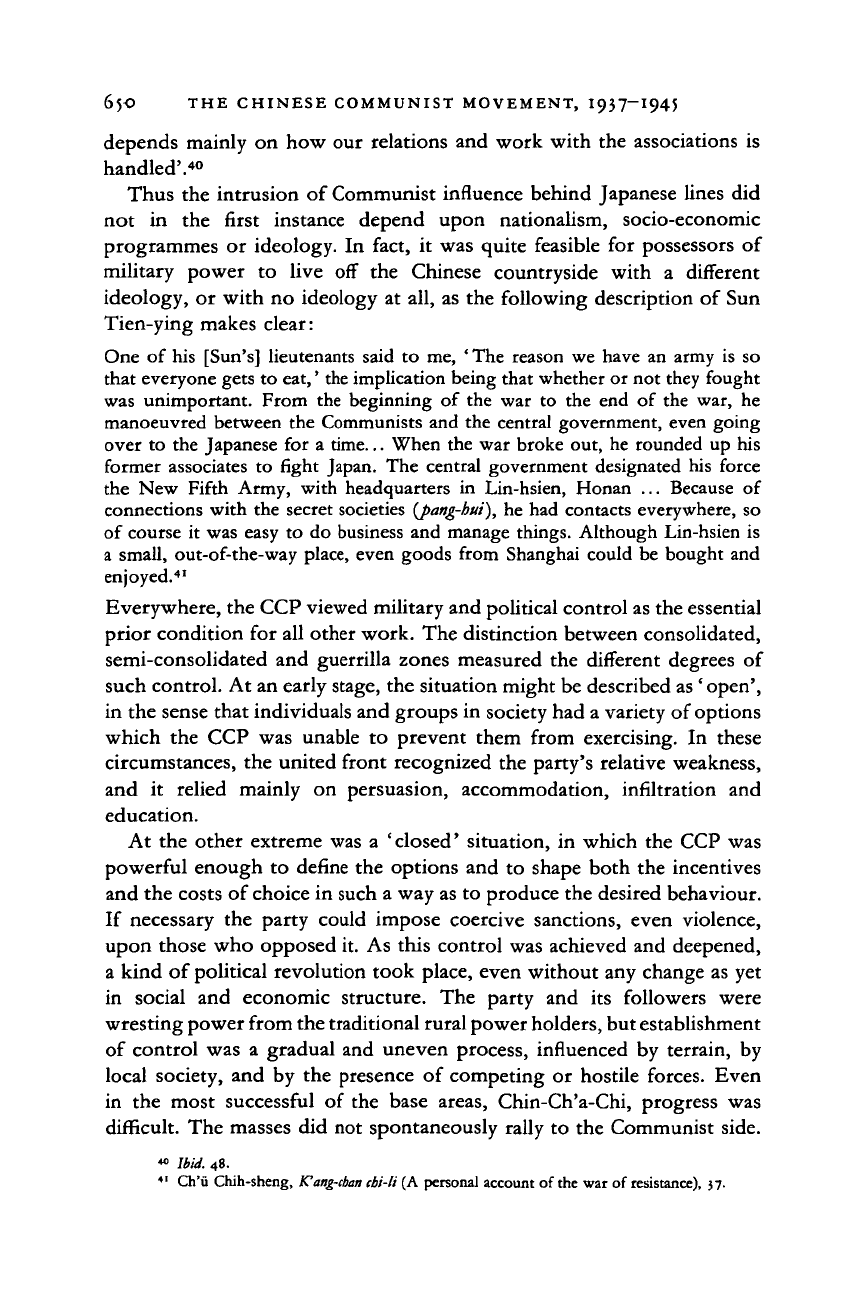
65O THE CHINESE COMMUNIST MOVEMENT,
depends mainly
on
how our relations and work with the associations
is
handled'.
40
Thus the intrusion of Communist influence behind Japanese lines did
not
in the
first instance depend upon nationalism, socio-economic
programmes
or
ideology.
In
fact,
it
was quite feasible
for
possessors
of
military power
to
live
off the
Chinese countryside with
a
different
ideology,
or
with no ideology
at
all, as the following description
of
Sun
Tien-ying makes clear:
One
of
his [Sun's] lieutenants said
to
me, '
The
reason we have an army is so
that everyone gets to eat,' the implication being that whether or not they fought
was unimportant. From the beginning
of
the war
to
the end
of
the war,
he
manoeuvred between the Communists and the central government, even going
over to the Japanese for a time... When the war broke out, he rounded up his
former associates
to
fight Japan. The central government designated his force
the New Fifth Army, with headquarters
in
Lin-hsien, Honan
...
Because
of
connections with the secret societies
(J>ang-hni),
he had contacts everywhere, so
of course
it
was easy to do business and manage things. Although Lin-hsien
is
a small, out-of-the-way place, even goods from Shanghai could be bought and
enjoyed.
41
Everywhere, the CCP viewed military and political control as the essential
prior condition for all other work. The distinction between consolidated,
semi-consolidated and guerrilla zones measured the different degrees
of
such control. At an early stage, the situation might be described as 'open',
in the sense that individuals and groups in society had a variety of options
which the CCP was unable
to
prevent them from exercising.
In
these
circumstances, the united front recognized the party's relative weakness,
and
it
relied mainly
on
persuasion, accommodation, infiltration
and
education.
At the other extreme was
a
'closed' situation,
in
which the CCP was
powerful enough
to
define the options and
to
shape both the incentives
and the costs of choice in such a way as to produce the desired behaviour.
If necessary
the
party could impose coercive sanctions, even violence,
upon those who opposed it. As this control was achieved and deepened,
a kind of political revolution took place, even without any change as yet
in social
and
economic structure.
The
party
and its
followers were
wresting power from the traditional rural power holders, but establishment
of control was
a
gradual and uneven process, influenced
by
terrain,
by
local society, and
by
the presence
of
competing
or
hostile forces. Even
in
the
most successful
of
the base areas, Chin-Ch'a-Chi, progress was
difficult. The masses did not spontaneously rally to the Communist side.
«
Ibid.
48.
41
Ch'ii Chih-sheng,
ICang-cban
tbi-li (A personal account of the war of resistance), 37.
Cambridge Histories Online © Cambridge University Press, 2008
